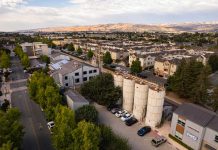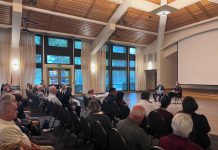San Jose Mayor Ron Gonzales and others continue to try shoving
development of Coyote Valley down our throats when this development
is clearly unnecessary and will cause long-term, irreversible
problems for the region.
By Brian Schmidt
San Jose Mayor Ron Gonzales and others continue to try shoving development of Coyote Valley down our throats when this development is clearly unnecessary and will cause long-term, irreversible problems for the region.
San Jose’s General Plan has for decades included several conditions designed to ensure that development within the city occurs when and where it makes sense. Pro-development forces are suggesting abandoning these conditions, also called “development triggers,” in their rush to pave over Coyote Valley.
Ask the City of San Jose and the Coyote Valley Task Force to ensure that if they must develop Coyote Valley (which CGF opposes), that they follow the city’s General Plan.
What’s happening: The General Plan’s “development triggers” attempt to ensure that (a) development within the city occurs only when the city is fiscally ready, (b) development occurs only when actually necessary, and (c) development proceeds in a way that balances jobs with housing.
We consider the General Plan triggers to be, if anything, too lenient in allowing development to proceed. Unfortunately, in an effort to push through development of Coyote Valley, Mayor Gonzales and others have signaled that they intend to abandon these triggers.
Why this is important: Development of Coyote Valley would destroy thousands of acres of farmland and lead to further sprawl in Santa Clara County and beyond. As it is currently proceeding, this development – planned to be the size of the city of Mountain View – would also significantly worsen traffic and exacerbate the jobs-housing imbalance.
Coyote Valley is one of the last vestiges of Santa Clara County’s agricultural heritage. CGF has been fighting off plans to develop this gorgeous valley for more than three decades now.
And, of course, the triggers identified in the General Plan are designed to promote sound development when and where it is needed. Ignoring them now in a rush to pave the valley will create long-term problems for the entire region.
What you can do: Join Committee for Green Foothills in asking San Jose Mayor Ron Gonzales, the San Jose City Council, and the Coyote Valley Specific Plan Task Force to evaluate development needs citywide (particularly downtown and in the North First Street area) before committing to the development of Coyote Valley, and adhere to and strengthen the “development triggers” that are required by the General Plan, ensuring that development occurs first in central San Jose, that the city is fiscally ready for this development, and that the city actually needs this development.
Mayor Ron Gonzales, San Jose City Councilmembers, 801 N. First St., San Jose, CA 95110. Fax: 408-277-3868.
E-mail the mayor and the councilmembers at ma********@*******ca.gov, li***********@*******ca.gov, fo**************@*******ca.gov, di*******@*******ca.gov, district4 @sanjoseca.gov, di*******@*******ca.gov, Di*******@*******ca.gov, di*******@*******ca.gov, da**********@*******ca.gov, or ju*********@*******ca.gov.
Members of the Coyote Valley Specific Plan Task Force, c/o Sal Yakubu, Principal Planner, 801 North First St., San Jose, CA 95110. Fax: 408-277-3250. E-mail the Coyote Valley Specific Plan Task Force via planner Sal Yakubu at 20*************@*******ca.gov
Request that your letter or e-mail be distributed to the entire Task Force.
Fax or e-mail a copy of your message to us, to help us track our efforts on this issue: Fax 650-968-8431 or e-mail ac****@************ls.org.
To learn more, read our recent blog entries on Coyote Valley and other articles on our website, www.GreenFoothills.org. Speak up for the protection of Coyote Valley. Your voice does make a difference.
Brian Schmidt is a legislative analyst for Committee for Green Foothills. He can be reached at Of****@************ls.org. Readers interested in writing a guest column should contact editor Walt Glines at ed******@*************es.com or 408-779-4106.







